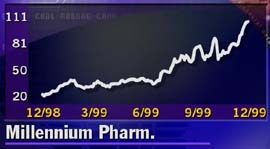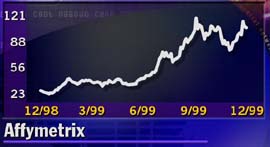|
Wall St. keen on genes
|
 |
December 13, 1999: 6:34 a.m. ET
But some wonder if stocks in booming biotech sector are sound investments
By Staff Writer Martha Slud
|
NEW YORK (CNNfn) - Scientists worldwide are racing to decode the tens of thousands of genes that make up the human body, in hopes that this genetic blueprint can be used to better understand what causes disease and how to create new drugs.
At the same time, Wall Street is in a race of its own, bidding up shares of some leading companies in this burgeoning sub-sector of the biotech field, called genomics, the study of the entire collection of human genes.
Stocks in companies including genomics researcher Millennium Pharmaceuticals (MLNM) and Affymetrix Inc. (AFFX), which makes technology that allows genetic data to be read, have soared over the past year amid publicity about scientific advancements and a wave of deal making between genomics companies and big pharmaceutical firms.
Last month, pharmaceutical giant Pfizer Inc. (PFE) announced a major deal with database firm Incyte Pharmaceuticals Inc. (INCY) to compile a library of genes, as well as a pact with gene-sequencing firm Celera Genomics Group (CRA) to search for genes that may lead to the discovery of new drugs.
Pfizer says these and other recent gene-focused collaborations, worth a reported $300 million over five years, will allow the company to find new ways to develop drugs for a wide array of diseases. Industry analysts say more deals involving other major pharmaceutical makers are likely on the horizon.
"The genomics industry I think today is viewed as one of the sexiest areas within biotechnology, and as such you've seen a tremendous surge in some of the (stock) valuations,” said Robert Toth, a biotech analyst at Prudential Vector Health Care. "Now you see these companies valued more like Internet stocks, or high-tech stocks.”
In fact, many companies involved in gene sequencing, such as Celera, are engaged in high-tech research that involves supercomputing -- making the stocks even more similar to high-flying computer companies.

Millennium Pharmaceuticals'
rise over the past year.
Celera and several other companies are competing to sequence the entire human genome. Meanwhile, the Human Genome Project, a $3 billion publicly funded international consortium, is working to do the same thing. The Human Genome Project has moved up its completion target to 2003, from 2005, because of the private competition.
Scientists say that once they crack the body’s genetic code, they then may be able to determine what molecules predispose someone to breast cancer or Alzheimer’s or hundreds of other diseases. Doctors then could diagnose disease much quicker based on a person’s genetic profile, and drug makers could develop medicines that are "tailor made” for a patient’s genetic makeup.
"We see a paradigm shift in drug discovery," says Kate Robins, a Pfizer spokeswoman specializing in research and development. "The future of medicine is going to be highly customized prescribing and highly customized drugs ... What you may end up with is instead of one sweeping drug, you may end up with eight or nine subsets."
The potential boom for the drug industry is enormous, said Gayatri Sondhi, who has studied genomics for the Boston Consulting Group.
While the traditional road to success for pharmaceutical companies has been huge sales of blockbuster drugs that can be prescribed on a mass scale, studies show about 20 percent to 50 percent of all prescriptions written are either only marginally effective or completely ineffective for the patient, Sondhi said. A new era of customized medicine would create a scenario in which fewer pills of each type are sold, but each pill will be of higher quality and pose fewer side effects, she said.
"My guess is that after five or so years we will have drugs for most major diseases that are somewhat targeted -- although the targeting won't be that good," she said. "And in 10 to 15 years there would be targeted drugs that are somewhat good."
‘A lot of speculation out there’
Genomics was thrust into the spotlight two weeks ago when an international team of scientists announced it had mapped the first human chromosome, called chromosome 22, a development that’s considered an important step toward completion of the Human Genome Project.
While the mapping of chromosome 22 had little commercial impact itself, says Cowen & Co. biotech analyst Eric Schmidt, that didn’t stop investors from buying up shares of many major genomics companies in response. The entire genomics sector’s market capitalization rose by about $1 billion in one day after the news about chromosome 22 was announced.

Performance of Affymetrix shares
over the past year
"There's a lot of speculation out there,” Schmidt said. "Frankly a lot of these valuations may not be sustainable in the near term.”
The past year has seen huge increases in several genomics stocks. Shares of Millennium have jumped from a 52-week low of 19-1/2 to a high of 110, although the stock pulled back this week after a downgrade from Goldman Sachs. The stock is now trading in the $100-per share range.
Santa Clara, Calif.-based Affymetrix, which is about 35 percent owned by drug maker Glaxo Wellcome (GLX), has risen as high as 127 from a low of 22-1/2 a year ago. It’s now trading at about 108. And stock in CuraGen Corp. (CRGN), a drug discovery and development company based in New Haven, Conn., has climbed to a high of 53-7/8 from a low of 5 . Last week, the stock gained ground after the company announced a five-year pact with drug developer Abgenix Inc. (ABGX) to develop genomics-based antibody drugs.
A good time to invest?
Analysts caution that genomics is a particularly complex sector of biotech and investors first need to understand how the industry is structured.
One tier of companies comprises firms that are building the tools and equipment to aid in genomics research, such as PE Biosystems Group (PEB), of Norwalk, Conn., one of two separately traded units of PE Corp., as well as Affymetrix and Qiagen (QGENF), a Netherlands-based company traded on the Nasdaq.
Another segment of the industry is made up of companies that use these decoding tools to assemble and discover genomic information and then deposit that information into huge databases.
One such company is Rockville, Md.-based Celera Genomics, PE Corp.’s other tracking stock, which has publicly announced that it would decode the entire human genome quicker than the Human Genome Project. Other companies in this category include Incyte, of Palo Alto, Calif., and Gene Logic Inc. (GLGC) of Columbia, Md.
Another tier of genomics companies are trying to use all of this information to discover new drugs. Companies in this group include Millennium, Salt Lake City-based Myriad Genetics Inc. (MYGN) and Human Genome Sciences Inc. (HGSI), of Rockville, Md. No company has yet brought a genomics-based drug to market yet, and analysts expect such a development to be at least several years away.
In October, Millennium announced it would buy biotech firm LeukoSite Inc. (LKST) for about $725 million in stock, bringing LeukoSite’s advanced stage drug development program under its wing, including a monoclonal antibody drug under study for treatment of leukemia. Analysts say the move is designed to boost Millennium’s short-term revenues. Both companies are based in Cambridge, Mass.
Getting in
Analysts say that especially for the novice investor, it may be wise to stick with some of the companies that are already profitable and have steady revenue streams.
"Look for business models that make sense,” advises Toth. "Do they have the potential to generate revenue either near term and/or long term?”
Schmidt points to the genomics equipments companies, such as PE Biosystems and Qiagen, as good bets since they are producing the sequencing tools that many other companies will use. Cowen rates both stocks as "strong buys.”
Meanwhile, Kevin Tang, who follows genomics companies for Deutsche Banc Alex. Brown, recommends Incyte as a "strong buy,” saying that it is poised for major growth over the next few years.
"Incyte has more than $150 million in annual revenues growing north of 20 percent a year, and those revenues are based on three- to five-year guaranteed contracts with roughly 25 of the world’s leading drug companies,” he said.
Another issue to consider is lawsuits. Earlier this week, Incyte sued Gene Logic for alleged patent infringement associated with technology used in gene expression databases. The lawsuit is not likely to have a major impact on Gene Logic’s business, Schmidt said. But Toth predicts a wave of similar lawsuits to hit the industry in the coming years and advises investors to consider legal issues when making investment decisions.
Meanwhile, questions remain about the valuations on many of these companies -- and analysts say investors should be careful. Toth, for example, views Millennium Pharmaceuticals as "a fantastic company” but he has a "hold” rating on the stock because of its surging valuation.
"Is it (genomics) a little ahead of itself right now? I would say yes,” Toth said. "The model in itself still needs to be validated. It will ultimately change the scope of health care, but you have to ask yourself if the surge in value we've seen isn't factoring in a lot of success over the next five years that we're yet to see.” 
|
|
|
|
|
 |

|

